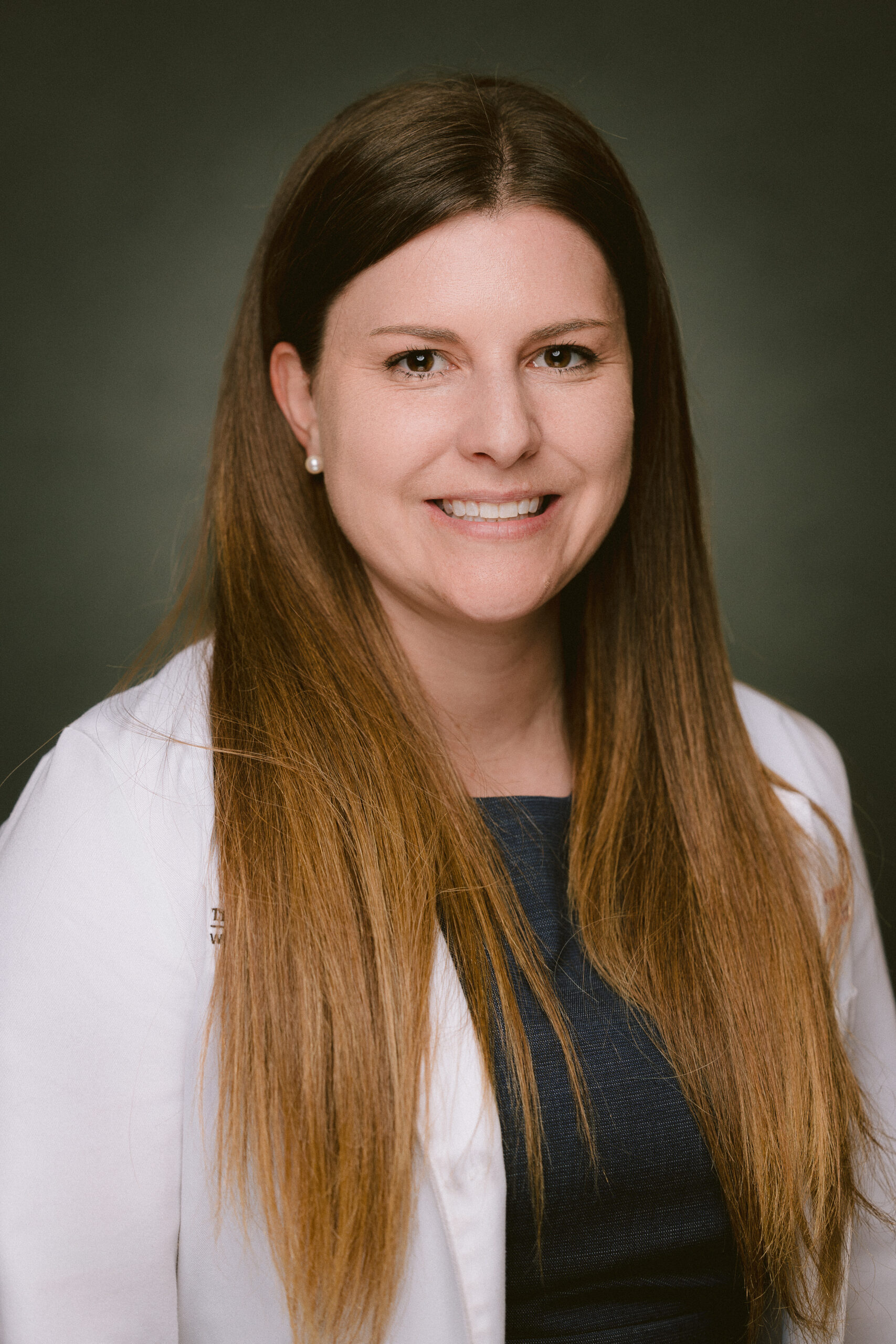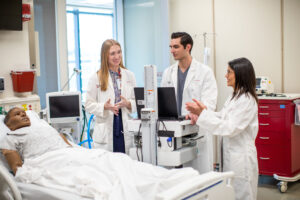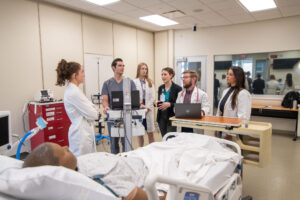PGY2 program
Residency Program Director
-

Molly Thompson, PharmD, BCCCP
- PGY2 Critical Care Residency Program Director, The Ohio state University Wexner Medical Center
- Specialty Practice Pharmacist, Trauma/Surgery/Burn Critical Care
- PGY1 Pharmacy/PGY2 Critical Care Residency – Grady Memorial Hospital, Atlanta Georgia
- PharmD, The University of Kentucky
Previous Year Residents
-
Jacob Counts, PharmD, BCCCP
Specialty Practice Pharmacist Neurocritical Care, The Ohio State University Wexner Medical Center -
Angad Sodhi, PharmD
Clinical Pharmacist Vascular Intensive Care, UF Health Shands Hospital -
Oyshik Banerjee, PharmD, BCPS, BCCCP
ICU Float Pharmacist, UF Shands Hospital -
Emily Nicholson PharmD
ICU Pharmacy Specialist Overnight, Boston Medical Center -
Kayla John, PharmD, BCCCP
Clinical Pharmacist Neurocritical Care, UNC Hospital -
Eileen Friery, PharmD
ICU Pharmacist, West Virginia University Medicine -
BrookeAnne Magrum, PharmD, BCCCP
Specialty Practice Pharmacist, OSU East Hospital -
Sara Atyia, PharmD, BCCCP
Clinical Pharmacist Medical Intensive Care, MetroHealth -
Adam Wiss, PharmD, BCCCP
Clinical Pharmacy Specialist, Saint Thomas West -
Alexandria Rydz, PharmD, BCCCP
Surgical/Burn ICU Clinical Specialist Pharmacist, University of Missouri Health Care
About the PGY2 Critical Care Residency Program
Residents completing this residency program will have a well-rounded experience in caring for medical, surgical, neurocritical care and cardiovascular critical care populations. The residency program is designed to develop independent critical care pharmacists specialized in providing direct and indirect patient care to critical care patients as a part of an interdisciplinary team. In addition, the resident will learn to independently perform research and process improvement projects, participate in medical emergencies and educate other pharmacists, healthcare professionals, and students
Residency Sites
As one of America’s top ranked academic medical centers, the mission of The Ohio State University Wexner Medical Center (OSUWMC) is to improve people’s lives through innovation in research, education and patient care. OSUWMC is a 1,5 06 bed multi-hospital delivery system recognized in 2018 as one of “America’s Best Hospitals” for excellence in ten specialties by US News and World Report based on quality, outcomes, and reputation.
06 bed multi-hospital delivery system recognized in 2018 as one of “America’s Best Hospitals” for excellence in ten specialties by US News and World Report based on quality, outcomes, and reputation.
University Hospital (UH)
University Hospital (UH) is our flagship hospital with over 900 beds. UH is a major referral center for patients throughout Ohio and the Midwest, and is one of the busiest kidney and pancreas transplant centers in the world. UH is also an international center for neuromodulation research and neurological care. In addition, UH is a level 1 trauma center in addition to being the American Burn Associated verified adult burn center for the region.
The James Cancer Hospital and Solove Research Institute
The OSUCCC – James strives to create a cancer-free world by integrating scientific research with excellence in education and patient-centered care — a strategy that leads to better methods of prevention, detection and treatment. Ohio State is one of 51 National Cancer Institute (NCI)-designated Comprehensive Cancer Centers and one of only a few centers funded by the NCI to conduct both phase I and phase II clinical trials on novel anticancer drugs sponsored by the NCI. As the cancer program’s 356-bed adult patient-care component, The James is one of the top cancer hospitals in the nation as ranked by U.S. News & World Report and has achieved Magnet® designation, the highest honor an organization can receive for quality patient care and professional nursing practice. With 21 floors and more than 1.1 million square feet, The James is a transformational facility that fosters collaboration and integration of cancer research and clinical cancer care.
The Ross Heart Hospital
The Ross Heart Hospital is a leader in cardiology and heart surgery and is the only nationally ranked heart hospital in the area. Each floor of the 150-bed hospital is dedicated to a specific service, which helps us provide specialized care for every patient. The Ross is one of the largest centers for the implantation of LVAD devices in the world in addition to providing heart and lung transplants.
University Hospitals East (UHE)
University Hospitals East (UHE) blends the friendly atmosphere of a community hospital with the advantages of being a part of a major academic medical center. Located on the eastern edge of downtown Columbus, University Hospital East offers renowned Ohio State services in orthopedic care, emergency services, cancer care, addiction services, ear, nose and throat care, heart care, radiology and imaging services, rehabilitation and wound healing. University Hospital East has a 19 bed mixed medical/surgical ICU.
The Brain and Spine Hospital
The Brain and Spine Hospital opened in the Fall of 2016 and is a state-of-the-art facility for the advanced management, care and healing of patients with neurological disorders.The hospital consists of 87 private beds and specialized units for stroke and neurovascular, neurotrauma, epilipsy, spine, chronic pain, neuromodulaton, multiple sclerosis, congnitive and movement disorders, as well as an innovative new model for acute spinal cord injuries.
The Department of Pharmacy
The Department of Pharmacy at The OSUWMC is one of the largest in the country. With over 400 employees, and a practice model that includes both clinical pharmacy generalists and clinical pharmacy specialists, our goal is the provision of outstanding, state of the art care. We advise our staff on the best use of medications, develop safeguards for our patients to prevent medication errors and develop transformative pharmacy practice in health-systems. We are guided in this mission by our strategic plan that focuses on five key priorities: optimizing our pharmacy information system, refining our practice model, enhancing our medication safety program, establishing the pharmacy as a workplace of choice in Central Ohio and refining our academic relationships and department scholarship.
Training future generations of pharmacists is a vital part of our mission. Our pharmacists serve as preceptors for our residency programs while providing experiential training for Doctor of Pharmacy (PharmD) students. Our residency program has a 55-year tradition of excellence with our graduates being well-prepared to work at a high-level in a wide-variety of institutional and ambulatory patient care facilities.
The Department of Pharmacy, in partnership with the Ohio State College of Pharmacy, strives to develop the skills of our residents and provide a residency program that is recognized nationally for the quality and excellence of its graduates.
Key Learning Experiences and Opportunities
Required rotations (4 – 5 weeks in length and include):
- Medical Intensive Care
- Medical Hematology/Oncology Critical Care
- Surgical/Trauma or Surgical/Trauma/Burn Intensive Care
- Neurocritical Care
- Cardiovascular Intensive Care
- Orientation* if new to OSU
- Research
- Precepting and Advanced Precepting (as part of required or selective rotations)
- Must complete 8 months in an intensive care unit.
Selective Rotations (select 2):
- Community Mixed Intensive Care at OSU East
- Surgical/Trauma or Surgical/Trauma/Burn Intensive Care
- Neurocritical Care II
- Advanced Cardiovascular Intensive Care
Elective Rotations (2-5 weeks in length and include, but are not limited to):
- Burn
- Cardiology
- Emergency Medicine
- Hepatology
- Infectious Diseases
- Pain and Palliative
- Trauma/Nutrition Support
- Advanced Trauma/Surgery Intensive Care
- Advanced Neurocritical Care
- Advanced Medical Intensive Care
- Pediatric Intensive Care at Nationwide Children’s Hospital
- Selective rotation not previously chosen
Longitudinal Rotations:
- Post Intensive Care Syndrome Clinic
- Research
- Teaching
- Clinical and Operation Staffing
- Professional Education
- Quality and Leadership in Critical Care
The program is designed to develop the resident’s clinical expertise in critical care and provide the necessary skills in teaching, quality improvement, and management of medical emergencies. In addition, this residency has a significant focus on clinical outcomes research. To improve research abilities, the resident will interact with clinicians with extensive research experience and participate in the Pharmacy Research Series. The PGY2 Critical Care Resident will be expected to design, implement and prepare a manuscript suitable for publication for their chosen research project. Additional opportunities for research and publication are available if the resident desires.
Other key experiences during the residency will include completion of a longitudinal quality project, active reporting and follow up of medication safety events for an assigned critical care area, as well as both operational and clinical staffing weekends throughout the residency year. In addition, the resident will prepare and deliver at least one formal didactic lecture at The Ohio State University College of Pharmacy and precept both APPE and IPPE students from The Ohio State University College of Pharmacy. The goal of the program is to develop independent pharmacy practitioners who will become integral members of the critical care team by exposing residents to a breadth of experiences throughout the residency year. The resident will also have the opportunity to attend the ASHP Midyear Clinical Meeting, the Society of Critical Care Medicine Annual Congress and other local or regional educational seminars/conferences as applicable.
Key Preceptors
Josh Arnold, PharmD, BCCCP, BCPS
Hematology/Oncology Medical Intensive Care
Kari Cape, PharmD, BCPS
Medical Intensive Care
Jacob Counts, PharmD, BCCCP
Neurocritical Care
Bruce Doepker, PharmD, BCPS
Medical Intensive Care
Jessica Elefritz, PharmD, BCCCP, FCCM
Hematology/Oncology Medical Intensive Care
Tony Gerlach, PharmD, BCPS, FCCM, FCCP
Surgical/Trauma Critical Care
Casey May, PharmD, BCCCP, FNCS
Neurocritical Care
BrookeAnne Magrum, PharmD, BCCCP
Mixed Medical/Surgical Critical Care, OSU East
Claire Murphy, PharmD, BCPS, FCCM
Surgical/Trauma/Burn Critical Care
Megan Phelps, PharmD, BCCCP
Mixed Medical/Surgical Critical Care, OSU East
Alan Rozycki, PharmD, BCCCP
Cardiovascular Intensive Care
Lindsay Ryder, PharmD, BCPS
Medical Intensive Care
Victoria Williams, PharmD, BCCCP
Medical Intensive Care
Molly Thompson, PharmD, BCCCP
Surgical/Trauma/Burn Critical Care
Selected Resident Research Over the Last 5 years
- Comparison of fixed dosing versus train of four titration of cisatracurium in COVID-19 ARDS patients. J Pharm Pract . [Epub ahead of print] -Banerjee O, Elefritz JL, Doepker BA, Atyia SA, Brummel N, Smith R, Labib M, Cape K
- Efficacy of continuous infusion ketamine for analgosedation in the medical intensive care unit: a propensity-matched analysis. J Pharm Pract. 2023 [Epub ahead of print] – Magrum B, Elefritz JL, Eisinger G, McLaughlin E, Doepker BA
- Impact of initial fluid resuscitation volume on clinical outcomes in patients with heart failure and septic shock. J Intensive Med. 2023 [Epub ahead of print] – Wiss A, Doepker BA, Kiracofe B, Olson LM, Elofson KA, McLaughlin E, Esguerra V, Elefritz JL
- Early initiation of vasopressin reduces organ failure and mortality in shock. Shock. 2022 [Epub ahead of print] – Rydz AC, Elefritz JL, Conroy M, Disney KA, Miller CJ, Porter K, Doepker BA.
- Evaluation of dexmedetomidine dosing in obese critically ill patients. Journal of Pharmacy Practice. 2021 [Epub ahead of print] – Atyia SA, Smetana KS, Tong MC, Thompson MJ, Cape KM, May CC.
- Assessment of fluid resuscitation on time to hemodynamic stability in obese patients with septic shock. Journal of Critical Care. 2020 [Epub ahead of print] – Kiracofe-Hoyte BR, Doepker BA, Rhia HM, Wilkinson R, Rozycki E, Adkins E, Lehman A, Van Berkel MA.
- Evaluation of rectal vancomycin irrigation for treatment of Clostridiodes difficle infection in patients post-colectomy for toxic colitis. Surgical Infections. 2019; 20 (5): 411-15. – Feeney ME, Thompson M, Gerlach AT, Rushing A, Evans DC, Eiferman DS, Murphy CV.
- The impact of serum zinc normalization on clinical outcomes in severe burn patients. Burns 2019 [Epub ahead of print]. – Olson LM, Coffey R, Porter K, Thomas S, Bailey JK, Jones LM, Murphy CV.
- Impact of a nursing-driven sedation protocol with criteria for infusion initiation in the surgical intensive care unit. J Crit Care. 2019 [Epub ahead of print]. – Kaplan JB, Diferman DS, Porter K, MacDermott J, Brumbaugh J, Murphy CV
- Impact of serum phosphate in mechanically ventilated patients with severe sepsis and septic shock. J Intensive Care Med. 2018; 50: 195-200. – Miller CJ, Doepker BA, Springer AN, Exline MC, Phillips G, Murphy CV.
- Association between chloride content of intravenous fluids and acute kidney injury in critically ill medical patients with sepsis. J Crit Care. 2018; 44:363-7. – Jaynes MP, Murphy CV, Ali N, Krautwater A, Lehman A, Doepker BA
Benefits and Additional Requirements
Application Deadline: January 4
We welcome applications from non-U.S. citizens who have a “green card” (permanent resident status) or a current visa valid through the entire duration of the residency program. The Ohio State University pharmacy residency programs are NOT able to sponsor visas for pharmacy residents (PGY1 or PGY2).
Start Date: July 1
Annual Salary – $54,000
Vacation Days – 10 days
Staffing Requirement – 20 weekends per year split between operational staffing in the critical care satellite pharmacy and shared clinical coverage for all of University Hospital
Emergency response coverage for University Hospital approximately 3 times/month and rotation specific code coverage each month
Completion of a Major Research Project
Completion of a research and quality improvement project through to implementation
Attendance at the Society of Critical Care Medicine Congress and ASHP Midyear Clinical Meeting are encouraged

TEACHING OPPORTUNITIES
Residents will have exposure to both didactic and experiential teaching opportunities and will serve as a primary preceptor for two APPE students. Residents may participate in the teaching and learning certificate program through The Ohio State University College of Pharmacy if interested.


You must be logged in to post a comment.